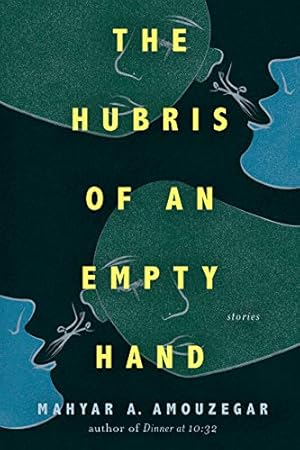« older | Main Largehearted Boy Page | newer »
November 22, 2021
Mahyar Amouzegar's Playlist for His Story Collection "The Hubris of an Empty Hand"
In the Book Notes series, authors create and discuss a music playlist that relates in some way to their recently published book.
Previous contributors include Jesmyn Ward, Lauren Groff, Bret Easton Ellis, Celeste Ng, T.C. Boyle, Dana Spiotta, Amy Bloom, Aimee Bender, Roxane Gay, and many others.
Mahyar Amouzegar's The Hubris of an Empty Hand is one of the year's most impressive short fiction collections, every story smart and propulsive.
BuzzFeed wrote of the book:
"A contemplative exploration of both inner and external lives."
In his own words, here is Mahyar Amouzegar's Book Notes music playlist for his story collection The Hubris of an Empty Hand:
I listen to the same 100 songs every time I write. I know it’s odd, but music to me is about the mood; it sets the tone for my words, from alternative to classical to country and folk to jazz to pop and rock. This was particularly true in writing The Hubris of an Empty Hand, as each of the eight stories needed its own temperament. So, I would go back to particular songs and listen to them repeatedly as if the sentences couldn’t come alive without each song’s rhythm and tone (but not necessarily its message).
The aria “Casta Diva” (Bellini’s opera Norma, performed by Maria Callas) was an essential ingredient for the first story in the book “Tell Me More”. It evoked a moment of tranquility before an oncoming disaster (a war in the opera)—possibly the end of the world in the book. The aria’s melodic line was like the momentary pause before realizing that the god’s gift may not have been a gift at all but a poison to humanity.
“Woman in Love” (Barbra Streisand) may sound a bit cheesy after more than forty years, but to me, it is an excellent ballad about giving of oneself completely to someone else and rationalizing why. If there is a relationship theme in this book, this would be the song for it, an all-encompassing emotional experience and an expectation for others to do the same.
“Suddenly Strange” (Bic Runga) was helpful to me in thinking about a long-term relationship that you know may be harmful, but you just can’t seem to break away from it. Bic Runga’s haunting voice was particularly effective when writing “The Gods in Between”.
“Everything I Own” (Bread). This is a song about the memory of lost loved ones, so it was an essential piece. In the Joseph story, I was compelled to listen to it several times to get in the mood for the scene where the character experienced a major tragedy. She would give everything she owned to get back what she lost.
The aria “O Mio Babbino Caro” (Puccini's Gianni Schicchi). Lauretta’s plea to her father to permit her to be with her lover is pure emotion. It’s no wonder this aria is more famous than the opera itself. Admittedly, it’s unusually short—under three minutes in length, but its lyrical expression is simply beautiful.
“Bad Moon Rising” (Creedence Clearwater Revival) is all about the dark side of America and, for me, the theme of the “Swedish Prison” story. Fogerty claimed the song is about “the apocalypse that was going to be visited upon us,” and that was one of the paths the gods may have put us on in my book.
“Bitch” (Meredith Brooks). I love how she conveys so much in a few words. Like most of us, she is that and more. Don’t define me. This is one of the rare songs that I paused and actually listened to its words rather than merely playing it in the background as I wrote.
“Strange Fruit” (Nina Simone) is an utterly sad song and beautifully evokes the imagery. I love Billie Holiday’s version as well.
“Songbird” (Fleetwood Mac). I picked this piece, but really the whole album is on my list. This one is the glue that binds the rest of the songs together. I think the character, Jackie, would sing it in the “Swedish Prison” if she were allowed to sing.
“Falling Slowly” (Glen Hansard & Markéta Irglová). This would be another theme song for the characters. It is about the hope that, in the end, everything is going to be okay. At the end of the chapter “This Life”, even Stock believes life would be fine as Death looks over his shoulders.
“Scarborough Fair” (originally by Simon and Garfunkel). I like Sarah Brightman’s rendition. It is about unrequited love, but as I was writing this book, it was about the relationship between the characters and their creator and the need for the former to be heard. But perhaps I ask too much of my characters, and they try hard to respond in the last story of the book, some not successfully.
“100 Tears Away” (Vonda Shepard) is one of my favorite songs, and for me, it tells everything about how Jackie feels about Amani throughout the book. She loves him and thinks if only he looked at her the same way she looked at him, everything would be alright. It didn’t work that way, of course.
Mahyar A. Amouzegar is the author of the previous novels, Dinner at 10:32, A Dark Sunny Afternoon, and Pisgah Road. His short story, Tell Me More, appeared in the Anthology of Short Stories as part of the Reading Corner Series. Mahyar has been in love with literature since he was a child in Tehran, and continued this passion when he moved to San Francisco as a teenager. He has lived and worked on four different continents and currently resides in New Orleans with his wife and two daughters.
If you appreciate the work that goes into Largehearted Boy, please consider making a donation.






